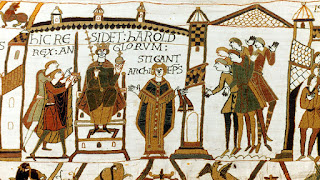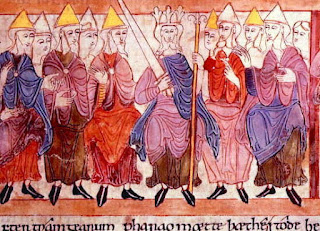This choice was not random. Not only was he in a line of legitimate succession, but it could be argued that his accession to the throne had been approved by Edward the Confessor before his death in January of 1066.
Edgar's great-grandfather was Æthelred. When Æthelred was killed by Cnut, his the family fled England. Ægthelred's son was Edmund Ironside, who would rule the south of England while Cnut ruled the north, until one of them died and the other took the whole island. Edmund died shortly after. Edmund's son was called Edward the Exile and spent most of his life in Hungary, where Edgar Ætheling was born. In the illustration above, you see Edmund in the upper-right, Edward the Exile in the center, and Edward's children below: Edgar, Margaret (who would later marry Malcolm Canmore and even later become a saint), Edmund (who died young), and Cristina.
In 1056, Edward the Confessor recalled Edward the Exile and his family to England to make Edward his heir. This was actually Edward's attempt to have an Anglo-Saxon dynastic succession in the face of the increasingly powerful Godwins. Unfortunately, Edward died shortly after returning to England, in 1057. Still, to the witenagemot, this meant that Edward's son Edgar was a potential successor. One day after Hastings and the loss of Harold, the witenagemot chose Edgar as the new king. He was perhaps 14 years old.
Edgar had powerful supporters: Earls Edwin and Morcar, Archbishop Stigand of Canterbury, the Archbishop of York. What he did not have was an army. The powerful men who supported him did not put together a very serious defense. Whatever claim he had through Edward's choice of Edgar's father had been ignored months earlier by these same men in favor of Harold, so their determination to support him is questionable; you might call it the last gasp of "national pride" before the inevitable Norman takeover.
In fact, Edward was never formally crowned, and by December the witan and Edgar's key supporters were agreeing to negotiate with William. Everyone, including Edward, agreed to pay homage to William.
William kept Edgar with him, first on his return to Normandy in 1067 and then back to England. A brief attempt at rebellion by the northern earls Edwin and Morcar in 1068 was quickly suppressed. We do not have confirmation that Edgar was part of it, but it is true that he and his mother and sisters landed on the coast of Scotland around that time. Either he was in the north as part of the rebellion or he was attempting to return to Hungary, the land of his and his siblings' birth.
They were taken in by King Malcolm III, a connection which offered another opportunity for Edgar to become king. I'll tell you how that went next time.






